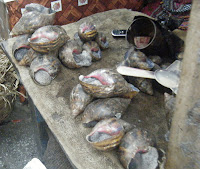“No crying, no tears, only celebration. He
wanted people to celebrate. He envisioned it to be a beautiful party. The most
amazing people would be there. His friends would celebrate his life.” -- Hunter S. Thompson
A Ghanaian funeral.
Interesting and essentially the polar opposite of a funeral in the
United States. Rather than a
solemn occasion for mourning, people attend a funeral in Ghana to celebrate
someone’s life. It's a party filled with drinking, dancing, and smiling.
At 6am, I boarded the college bus with about forty other Ghanaians. Teachers from the college and members
of the local church. We were
journeying to a town called Asaam for the funeral of the mother of the
vice-principal of my college.
Funerals do not happen immediately after someone dies in Ghana. For example, this woman passed over a
month ago. Some funerals happen a
year after a death. Some wait only
months. The wait has to do with
finding the funds to finance the funeral or gathering up family members that
may be scattered around the world. Traditional African cloth is worn to funerals. Black, red, brown, orange are the most common colors to see.

Upon arrival in Asaam, we went to the family’s home. Everyone sits down in red or black
plastic chairs that have the Ghanaian Adrinka symbol of God on them. Chairs in rows, all facing forward, are
placed under tents. Upon arrival,
we are expected to greet the family, and once we are seated, the family then
comes to welcome us by shaking everyone’s hands.


After sitting for a few minutes, we walked down the road to
where the actual funeral takes place.
The church service was in progress, so we waited outside. The casket, which was in the shape of a
bible, was carried out by college students dressed in military fare. Caskets in Ghana are often crafted to match the passion of the deceased. I was told caskets have been shaped as fish or buses. The casket was whisked away to the
cemetery, and we returned to the family’s home. For our second arrival, we were served food and drinks. At this time, donations were also
collected and receipts were distributed.
After a few hours of sitting, we again walked to the area near the church for the actual funeral. There are no funeral parlors here. This all happens outside. Surrounding a sort of shrine for the deceased are groups of red and black chairs under tents. At this particular funeral, three groups of chairs surrounded the shrine.

After a few hours of sitting, we again walked to the area near the church for the actual funeral. There are no funeral parlors here. This all happens outside. Surrounding a sort of shrine for the deceased are groups of red and black chairs under tents. At this particular funeral, three groups of chairs surrounded the shrine. Now, people don’t just bombard the chairs and have a seat. Each group that traveled to the funeral lines up single-file, men first, and women to follow. This line then goes and greets the family by shaking hands with each member. Then, that particular group sits in their designated area. After sitting, the family then comes and greets each person sitting in the chairs. It’s quite the process! This happens for each group that traveled to the funeral.




As groups were sitting and being greeted, an MC announced the donation
amount from each group. Some people give money, while others give minerals (coke, fanta, malta). This was all announced
on a loudspeaker that was comparable to the sound of a live concert in the
states. It’s ridiculous really.
It’s all muffled and just blaringly loud. This seems to be the norm with music at all events in
Ghana. So, as this MC did his
thing, the family danced near the shrine for the deceased and each group joined
in to give more money. A big dance
party, all in honor of the woman who passed. Of course the MC tried to throw me in to the mix. He spoke mostly in Twi, but I heard
“obruni” and “dance”, so I got the main idea. I kindly refused.
Everyone was already staring at me as it was, so I wasn’t interested in
any more attention.



When someone dies, posters are plastered all around town about it. Large ads are taken out in newspapers to honor the person as well. The person is truly celebrated in many ways.
The entire day was long and boring, but very fascinating. I’m so glad that my time in Ghana ended
with such an authentic experience.




















































